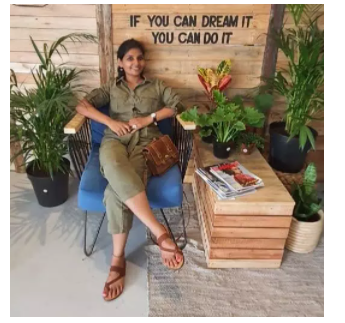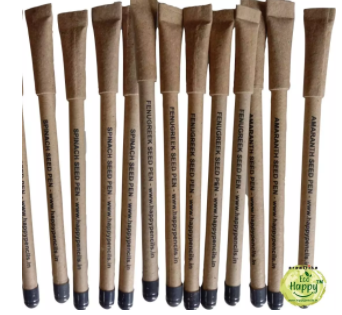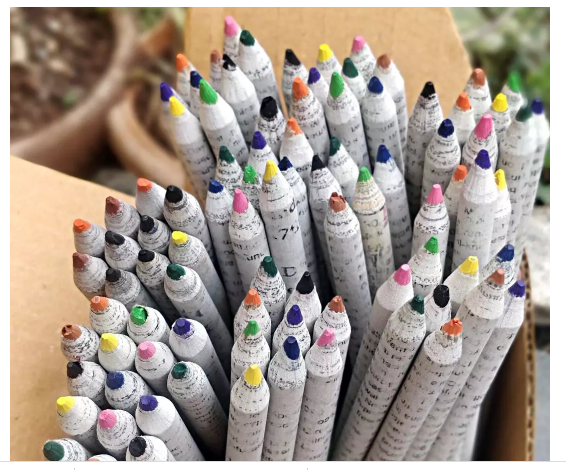Pollution is not an unknown word in today’s time. As quickly as plastic is available for us to use, it quickly enters oceans and grounds, leading to pollution heading nowhere. Even with recycling and reusing, it ends up in spaces that might not decay it, leaving it in the environment for the next 400 years. Is there really nothing we as an individual can do about it? An effective way to fight this is sustainable living, a well-known way of choosing wisely today so we can have a better future ahead. Araatrika is an organisation run by women trying to change the norms of day-to-day life products like newspaper pencils, eco – happy cutlery kit, and eco-happy seed rakhi.

Jagruti Khabiya Jain and Vaibhav Jain, founders of Araatrika are working towards reducing, reusing, recycling. Focusing on producing sustainable products and making them affordable Araatrika is contributing to a sustainable future.
Jagruti said, “Initially it was a small business, and we used to only do flea markets, exhibition and everything was DIY. This involved only me dealing with scrap and upcycle. The philosophy of Araatrika remains the same from the day it was born till today. At the start, it was all handmade, and now we have machines that help us produce more goods, and now we also have a bigger labour force which makes all the products for us.”

In today’s time, millennials are more aware of the climatic conditions, and they are most likely to fall in the category who would pay extra for eco-friendly products. Millennials (aged 22-35) are more likely than any other generation to say that they would pay extra for eco-friendly or sustainable products. (Young, 2018)
“When we started out, it was tough. We have to convince people to use these products. They would buy it because it is something different, not because of its eco-friendly. We always wanted it affordable, so you don’t even need to think about the price. Slowly, when our consumers understood what they were doing and how many trees they were saving just by switching on to pencils made of the waste newspaper, that was the point when they bought consciously,” said Jagruti.
Araatrika is not only changing people’s thinking about eco-friendly products having high prices, but it is also working towards helping women work on the field and have an identity in society. Jagruti mentioned “Starting from me being a woman to even our delivery, sticking, women do packing. 90% of our employees are women. We also have homemakers in different regions of India who are selling our pencils, and we intend to empower them through our platform. We, try to give them education as much as possible, let it be green or why they are doing what they do and why they are working for us. Apart from that, they are financially stable now. We also sometimes work towards supporting their children, or least with the possible stationery we can.”

Sustainable living is becoming a standard of living and gives hope for people to create their identity in society and contribute their bit to the environment. Araatrika has taken steps to collaborate with different NGO’s, and they include a self-help group in their process of making a better future.
Jagruti highlighted, “We support different NGO’s through our platform. Many products are made by women in collaboration with the NGO’s. God’s Angel NGO is one of them. It is a woman-centric NGO. Whenever we need any specific products to be made, we give them all the material and do the labour work. In return, we do different things like helping to get their kids a better supply of stationery or fund their medical expenses for a month.”
Tourism is one of the significant contributors to single-use plastic. These criteria use significant resources and need more energy to carry out the task directly or indirectly contribute to pollution.
“Travel kit has done exceptionally well since we have launched it. It thrills people to adapt these. It is just a compact bundle you carry, and you are plastic-free. It comes with a steel spoon, straw, fork. All the items present inside are eco-friendly. It is effortless to use, you can just hang it on to your bag,” said Jagruti

“There is no planet B, we have only one so why don’t we take care of it? Our everyday choices really matter. The smallest choice, like what pen you are using, really matters. So, we need to be mindful of our choices. Do we need to have questions like why we are using it? Where we are throwing it? What happens to after we throw it is important,” expressed Jagruti as she signs off.
Written By: Nidhi Choudhary

